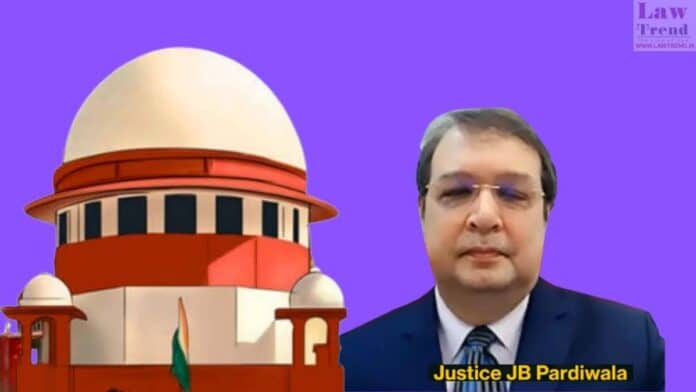Supreme Court judge Justice J B Pardiwala on Sunday warned that girl children face heightened risks in the online world and that India’s current investigative methods are not equipped to deal with complex cybercrimes. He urged stakeholders to go beyond policy discussions and judgments, and focus on grassroots-level action and mindset change.
He was speaking at the closing ceremony of the national annual stakeholders’ consultation on “Safeguarding the Girl Child: Towards a Safer and Enabling Environment for Her in India”, organised by the Juvenile Justice Committee of the Supreme Court in association with UNICEF India.
Addressing the gathering, Justice Pardiwala said this was the first event he had participated in during his three and a half years on the Supreme Court bench, stressing that issues like child protection deserve more attention than routine legal debates.
“I am a man of few words and when I want to say something straight, I do not believe in mincing words. Let me put it straight and pithily. Talking alone is not enough,” he remarked.
He said hundreds of consultations and handbooks cannot replace ground-level work. “Judgments are not going to be enough. The need of the hour is that we should work at the grassroots level. We need a team of people with hearts full of compassion and empathy,” he added.
Justice Pardiwala noted that the consultation’s cybercrime session brought out both the opportunities and dangers of the digital world.
“Girl children stand at a higher risk of also being victimised in the online space. Perpetrators capitalise on the anonymity, accessibility and interconnectedness of the digital domain to commit crimes against women and girls. Our present investigative methodologies are not attuned to effectively handle complex crimes committed in cyberspace,” he said.
He emphasised the need for stringent legal safeguards, enhanced law enforcement, and better use of technology to protect children online while enabling them to learn and grow.
Reflecting on India’s historical approach to children’s rights, Justice Pardiwala said it was unfortunate that collective efforts began late. “This may be because the children do not constitute a voting class and, therefore, are often overlooked by the policy makers,” he observed.
He noted that even after 75 years of the Constitution, the country continues to struggle to secure the rights of children, especially girls. However, he acknowledged steady progress driven by collective will.
Justice Pardiwala said that any discussion on protecting the girl child must start by recognising inherent gender biases. “We must be conscious that the problems faced by girl children are deeply rooted in our societal approach towards the female gender in general,” he said.
He pointed out that despite several laws and schemes for girls’ welfare, implementation remains a challenge due to deep-rooted social attitudes. “Any approach or attempt to correct a social wrong must begin within our own homes, by first identifying and confronting both the apparent and hidden discriminatory practices that persist within our own families and communities,” he added.
Justice Pardiwala stressed that true transformation does not start in policy documents or courtrooms, but in everyday life. “Actual change must therefore begin at the micro-level, within our homes, by treating children equitably, sharing responsibilities fairly, and modelling respect for the rights and dignity of girls in our daily lives. If every home becomes a space of equality and respect, society as a whole will follow,” he said.
He ended on a hopeful note, highlighting that many indigenous communities, including in the Northeast, celebrate the birth of a girl child — an approach he said society at large should emulate.




